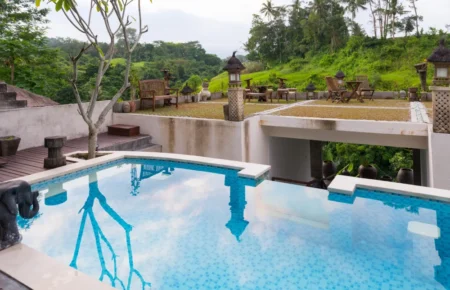 Owning a swimming pool can be a delightful addition to your home, providing endless opportunities for relaxation, exercise, and entertainment. However, it also comes with responsibilities and considerations.
Owning a swimming pool can be a delightful addition to your home, providing endless opportunities for relaxation, exercise, and entertainment. However, it also comes with responsibilities and considerations.
While owning a swimming pool offers numerous benefits but also entails responsibilities and considerations. By staying informed and proactive, you can enjoy a safe, clean, and well-maintained pool that enhances your home and lifestyle for years to come.
Before diving into pool ownership, here are seven essential things you need to know.
1. Maintenance Requirements
Swimming pools require regular maintenance to keep the water clean, balanced, and safe for swimming. This includes tasks such as skimming debris, vacuuming the pool floor, checking and adjusting chemical levels, and servicing filtration systems. Be prepared to dedicate time and resources to ongoing maintenance to ensure your pool remains in optimal condition.
2. Safety Measures
Pool safety should be a top priority for all pool owners. Install proper safety features such as fencing, self-closing gates, and pool covers to prevent unauthorized access, especially for households with children or pets. Additionally, consider investing in safety equipment such as life rings, reaching poles, and CPR training to respond effectively in case of emergencies.
3. Water Conservation
Maintaining a swimming pool requires a significant amount of water, especially during hot and dry seasons. Implement water conservation practices such as using a pool cover to minimize evaporation, repairing leaks promptly, and investing in water-efficient filtration systems. By being mindful of water usage, you can reduce your environmental impact and conserve valuable resources.
4. Budgeting for Costs
Owning a swimming pool entails various costs beyond the initial installation. Budget for recurring expenses such as water and electricity bills, chemical treatments, equipment repairs and replacements, and professional maintenance services. Factor in these ongoing costs when planning your budget to avoid unexpected financial strain down the line.
5. Local Regulations and Permits
Before installing a swimming pool, familiarize yourself with local regulations and permit requirements governing pool construction, safety standards, and property zoning restrictions. Obtain necessary permits and adhere to building codes to ensure compliance with legal requirements and avoid potential fines or penalties.
6. Seasonal Considerations
Seasonal changes can impact the maintenance and operation of your swimming pool. Be prepared to adjust your pool care routine based on factors such as temperature fluctuations, changing weather conditions, and increased pool usage during peak seasons. Implement seasonal maintenance tasks such as winterizing your pool to protect it from freezing temperatures and debris accumulation.
7. Professional Maintenance Services
While some pool maintenance tasks can be performed independently, certain tasks may require the expertise of professional pool technicians. Consider hiring reputable pool service providers for periodic inspections, equipment servicing, and troubleshooting complex issues. Professional maintenance services help ensure the longevity and performance of your pool while minimizing the risk of potential problems.
Adding or upgrading a pool can make any home look more attractive. If you are ready to invest in a fantastic new pool for your home in Tampa, FL, you can find more information and options for pool design and pool construction at JJB Pools and Spas.
Picture Credit: Freepik
